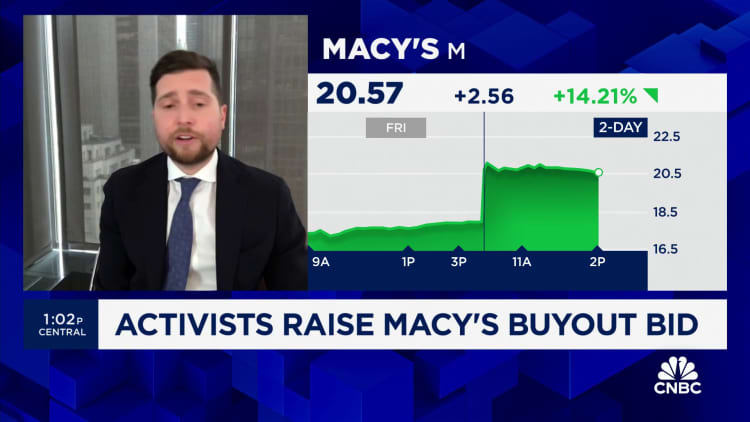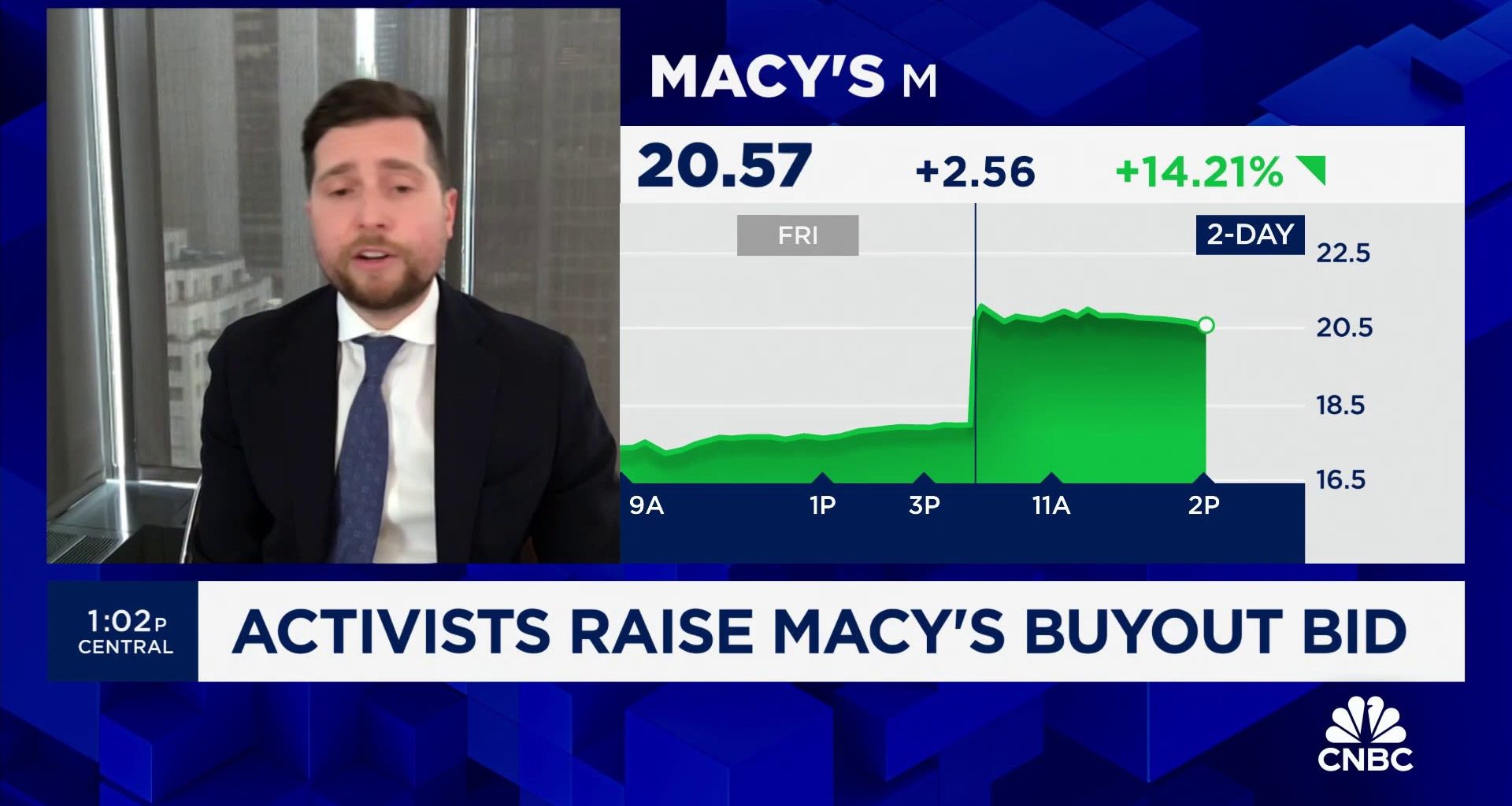Shopping bags in front of the Macy’s Inc. flagship store in the Herald Square area of New York, US, on Monday, Nov. 13, 2023. US holiday sales will grow at a slower pace this year amid economic headwinds such as higher interest rates, the National Retail Federation said.
Bing Guan | Bloomberg | Getty Images
Tony Spring was already working against the clock to turn Macy’s around.
Now, the CEO will have two fresh faces on the department store retailer’s board of directors as it weighs whether to bet on his vision or sell the nearly 166-year-old retailer to activist investors.
The board appointments, announced this week that put an end to a proxy fight with activist Arkhouse Management, are the latest development in a broader, and so far, unsuccessful effort by Arkhouse and fellow bidder Brigade Capital Management to acquire the iconic but struggling American department store retailer.
“It stops the pressures in the here and now,” said Neil Saunders, managing director of research firm GlobalData. “But in a way, you’re letting the wolf into the henhouse.”
Arkhouse first made a bid in December to buy Macy’s and take the company private at $21 per share. Macy’s rejected the offer, Arkhouse raised its bid, and Macy’s rejected that offer, too. Arkhouse then launched its proxy fight and put forward nine nominees to Macy’s 15-person board.
For Macy’s, this week’s settlement — an agreement to name two of Arkhouse’s nine candidates to its board — could pause the distraction and high costs of a prolonged campaign for shareholder support. For Arkhouse and Brigade, the move could help hand the keys to investors whose emphasis on real estate, not retail, has spurred fears that their acquisition could spell the end of Macy’s.
Both Macy’s and Arkhouse struck a conciliatory tone in their statements this week. But one thing is clear: The battle at Macy’s is not over.
Turning the tide
Other department store chains have faced challenges from activists in recent years, and even when those efforts fall short, the pressure can bring about sweeping changes.
With Kohl’s, for example, CEO Michelle Gass left the company to lead denim maker Levi Strauss after a lengthy battle with Kohl’s activists. At the time, her predecessor at Levi, Chip Bergh, said activist investors helped drive her out of Kohl’s doors.
Even before Macy’s had activist investors breathing down its neck, Spring faced an uphill battle.
The department store — with its flagship store in the heart of New York City’s Herald Square and its Macy’s Day parade that attracts the attention of millions of families on Thanksgiving morning — holds a storied place in American retail.
But by nearly every metric, Macy’s has gotten smaller over the past decade. Its employee count, store count and stock price have fallen as the company has lost market share to competitors, including off-price chains like T.J. Maxx, big-box stores like Target, as well as online retailers and specialty stores.
Macy’s shares, which hit a 10-year high of $72.80 in July 2015 and sank to a 10-year low of $4.81 in April 2020, closed at $19.30 on Friday, ending the week with a market value of $5.29 billion.
Macy’s said in late February that it expects net sales for the full year to be down slightly from the prior year. It anticipates comparable sales, which take out the impact of store openings and closures, to range from a decline of about 1.5% to a gain of 1.5% year over year on an owned-plus-licensed basis and including third-party marketplace sales.
Tony Spring, attends the Bloomingdale’s Holiday Window unveiling at Bloomingdale’s 59th Street Store on November 19, 2013 in New York City.
Ben Hider | Getty Images
Spring, the former CEO of Macy’s higher-end Bloomingdale’s chain and the man tasked with turning the tide, stepped into the top role in early February, about two weeks after the company announced it would cut more than 2,300 jobs and close five stores.
Spring laid out his vision for the retailer earlier this year, saying it will shutter many of the company’s fledging namesake stores and invest instead in stores that have fared better. That includes Macy’s locations with stronger sales as well as its two chains that have outperformed the namesake brand, higher-end department store chain Bloomingdale’s and beauty chain Bluemercury.
And while it will press ahead with plans to open smaller versions of Macy’s stores in strip malls, the aggressive plan will close more than 150 stores by early 2027 — nearly a third of its namesake stores — leaving the retailer with approximately 350 Macy’s locations.
The store counts of its other two chains are significantly smaller.
Take private
At the same time, the buyout effort by Arkhouse and Brigade threatens to change the retailer’s direction entirely.
Along with adding new members to Macy’s board, Arkhouse and Brigade have begun conducting due diligence, a process that allows the suitors access to the department store operator’s books so it can get a clearer sense of the company’s finances and potential liabilities.
That in and of itself had been a hard-fought battle with the bidders, who wanted more information to secure funding commitments for the proposed acquisition. Arkhouse claims Macy’s refused to engage with it, and Macy’s rebuffed Arkhouse saying it didn’t have the financing for the takeover it proposed.
GlobalData’s Saunders said Macy’s future as a retailer could be at risk if Arkhouse succeeds in its efforts to take the company private. He said the activist investor has a background in real estate, not retail, and seems more keen on sucking the value out of Macy’s prime mall and flagship locations than investing in its business.
“It’ll become a situation much like Sears,” he said. “A very long liquidation, in effect.”
Arkhouse, for its part, has said it plans to keep Macy’s stores open. In an interview with CNBC in March, managing partner Gavriel Kahane said the activist investor wants to run Macy’s as a retailer, along with getting value out of its real estate.
“Our plan is not conditioned on store closures. It is not a part, fundamentally, of our business plan at all,” he said. “In fact, we think the real estate is so valuable, in large part, because it’s occupied by Macy’s.”
Kahane said the activist investor wants Macy’s to become “a stable and growing company that can live for decades, and potentially another 150 years.”
But, he argued, a private company is better able to achieve that goal than a publicly traded one: “We think that needs to happen behind the curtain, away from the public markets. We think that current management has really been largely solving for the quarter and when you’re so focused on sort of that near-term execution, it’s really almost impossible to ensure your long-term viability.”
Arkhouse raised its bid last month to $24 per share and said it had the backing of Fortress Investment Group and One Investment Management.

Saunders noted the proxy settlement could buy the retailer time to carry out Spring’s turnaround strategy and try to drive up the value of the company.
The two new directors who will join the Macy’s board will bring a deep background in retail and real estate. Richard Clark spent nearly four decades in the real estate industry and was former chairman and CEO of Brookfield Property Group, Brookfield Property Partners and Brookfield Office Properties. The second director, Richard Markee, was former CEO of Vitamin Shoppe and held senior roles at Toys R Us and Babies R Us. He currently sits on the board of discount retailer Five Below.
While the two directors are independent, with no affiliation to either Arkhouse or Brigade, they’ll join the board’s seven-person finance committee, tasked with evaluating and making recommendations about the acquisition bid and any other similar offers.
Arkhouse managing partners Kahane and Jonathon Blackwell said in a statement this week that the appointments of the two new directors “will ensure that our discussions continue to be constructive and that our proposal is treated seriously and expeditiously.”
For Macy’s, agreeing to two new directors won’t tip the balance on the board. That could be seen as a victory for the retailer, since it’s a far cry from the total number proposed by Arkhouse, said Patrick Gadson, an attorney and co-head of the shareholder activism practice at Vinson & Elkins.
Still, the settlement allows Arkhouse to press ahead as a critical and persistent activist investor, said Gadson, who represented Preferred Apartment Communities, a real estate investment trust that Arkhouse similarly targeted and made a bid to acquire. Arkhouse was ultimately outbid by another buyer in that effort.
The Macy’s agreement is missing a non-disparagement clause, he said, and has “thin” standstill restrictions, or terms that can temporarily halt activist activity and muzzle the activist from making critical comments. That means Arkhouse and Brigade could still have room to run in their campaign.
“Shareholder activism is a performance-based skill set,” Gadson said. “If the company performs well, exceeds expectations markedly, then in all likelihood the performance itself would be the remedy. If the company fails to do that, then they can do all of the governance changes and all of the nonfundamental, nonoperational gymnastics they’d like, none of it will save them.”
Read More: World News | Entertainment News | Celeb News
CNBC










